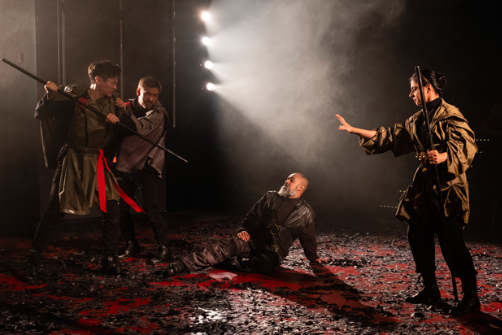
Henry VI
By William Shakespeare; Directed by Stephen Brown-Fried
Produced by National Asian American Theatre Company
Off Broadway, Classic
Runs through 9.8.18
A.R.T/New York Theatres, 503 West 53rd Street
by Dan Rubins on 8.20.18
 James Seol, John D. Haggerty, Rajesh Bose, and Mahira Kakkar in Henry VI. Photo by William P. Steele.
James Seol, John D. Haggerty, Rajesh Bose, and Mahira Kakkar in Henry VI. Photo by William P. Steele.
BOTTOM LINE: Don't miss this outstanding Shakespeare epic: six hours, two parts, and an all Asian American cast.
After seeing the National Asian American Theatre Company’s superbly staged two-part, six-hour production of Shakespeare’s Henry VI trilogy, I tried to recall how many Asian American actors in principal Shakespearean roles I’ve seen recently in New York. Other than Mahira Kakkar’s Paulina in Theatre for A New Audience’s The Winter’s Tale this spring, I’m at a loss.
I guess I shouldn’t be so surprised. That shameful disparity in casting creates the need for NAATCO, a nearly 30-year-old organization committed to performing European and American classics with all Asian American casts “as written, with no forced Asian cultural associations,” in the hopes of demonstrating that “new insights about old works can come from unexpected faces.” In the sense that this Henry VI features almost no allusions to the racial identities of the actors (the notable exception is the martial arts-influenced fight choreography, expertly and varyingly staged by Orlando Pabotoy and Kimiye Corwin), it is color-blind. Race never enters into the story itself, nor is there a separate story in the casting of South Asian and East Asian actors, for example.
On the other hand, because these actors would seldom be cast in most productions of this difficult, rarely staged trio of plays, there’s a palpable urgency in the excellence of the performances. By the end of six hours, it’s hard to picture anyone else in these roles, thanks to the relentless power of this company’s efforts.
That our focus holds for this (very rarely wearying) marathon is in large part due to the boundlessly creative, perpetually smart direction by Stephen Brown-Fried. Each of the many battle sequences somehow feels unique. Amazingly, no stage pictures ever seem to recur. Swift transitions add momentum to what could, in other hands, be numbing. That essential sense of freshness also comes from Kimie Nishikawa’s flexible pair of rolling staircases that become thrones, barricades, and molehills; from Reza Behjat’s electrifying lighting design; and from Toby Algya’s varied and intense sound design. Nicole Slaven’s gently contemporary costumes also enliven the overall look. Brown-Fried and his designers consistently make the venue appear grander than it really is. The harrowing, though stylized, violence that launches the second half of the play also serves to grippingly maintain our attention.
Although Brown-Fried’s adaptation (compressing three long plays known as Henry VI, Parts 1, 2, and 3 into two long plays called Foreign Wars and Civil Strife) feels compact and fluid, Shakespeare’s history-churning flood of names and battles remains overwhelming. “What plain proceeding is more plain than this?” the Earl of Warwick (Vanessa Kai) exclaims after the Duke of York (Rajesh Bose) has endlessly laid out the convoluted genealogy by which he claims the English throne. The query gets one of the evening’s heartiest laughs—I’m not entirely convinced that Shakespeare, writing for an audience that probably knew its Henrys from its Edwards better than we do, intended the irony—and much of Foreign Wars will leave unfamiliar audiences a bit bewildered by the parade of earls, dukes, and dauphins that debate, duel, and die in quick succession.
As this production exquisitely suggests, though, political history will always teem with diplomats whose fleeting presence on the world stage seems to matter so much while they’re there. Over the course of the fifty years that the trilogy traverses (1422-1471), the key players rise to the forefront and stick in the memory. By midway through Civil Strife, where things really start to heat up, there’s no question who’s who. All that early confusion comes to feel like part of the point of this ultimately sharp and focused production.
Those key players include the terrific Kakkar as Queen Margaret, who emerges as the play’s most intriguing antihero. Initially a feisty French princess flirting with, and falling for, her captor, the Duke of Suffolk (a superb Paul Juhn, adding a restorative villainous wit to Part 1’s talky second act), Margaret eventually ends up leading the final battles of the Wars in the Roses in Henry’s place, a ferocious, skillful general. Kakkar delivers an especially searing, tour de force performance in the bloodthirsty scene in which she tortures the imprisoned Duke of York, yawning and squealing gleefully as he rails against her “tiger’s heart wrapt in a woman’s hide!” It’s to Kakkar’s credit (and maybe Shakespeare’s, too) that you can’t help but root for Margaret, even after she’s cheerily wiped a father’s face with a handkerchief smeared with his slaughtered child’s blood.
Anticipating Margaret’s rise as a warrior, there’s Joan of Arc (Kim Wong, rousingly forceful), the implacable peasant who leads the French fight against England in the first act of Foreign Wars. In the trilogy’s most visceral and 2018-evoking sequence (although Brown-Fried thankfully lets the play speak for itself in conjuring the inevitable White House connections), a charismatic Irishman Jack Cade (a winning Ron Domingo) seduces a mindless mob into joining him in rebellion against the overbearing establishment nobility.
Appearing only in the play’s fourth quarter, there’s Richard, Duke of Gloucester (who’ll become, in a later play, Richard III); David Huynh offers a sneering and impulsive, if thoroughly un-redeeming, take on this infamous figure. And Kai, one of the few actors who gets to play just one part all the way through, becomes more and more prominent and impressive as the Earl of Warwick, a subtle schemer unashamed to change his stripes at the last minute.
But maybe best of all is Jon Norman Schneider in the title role. Schneider movingly portrays King Henry’s growth from a hesitant teenaged monarch who often literally recedes into the background into an experienced if largely impotent leader attempting to make his voice heard. This is a cerebral man, detached from the world but thrust into the highest seat of power, and Schneider is especially moving in a monologue, late in Civil Strife, when Henry longs for the shepherd’s easy life. Schneider’s likeable Henry often feels like the moral center of the play—in his most triumphant act of self-advocacy, he argues fervently, and correctly, that his uncle, the Duke of Gloucester (a commanding Mia Katigbak), is not treasonous—which sharpens one of the play’s central lines of inquiry: should Henry’s mild-mannered, ineffectual goodness disqualify him from holding the throne?
This is a production, too, that’s also potently pointed in its casting of women in men’s roles. The first three lines of the play are each delivered by women playing men, and the political power that these actresses get to wield throughout the show (Wai Ching Ho is especially fantastic as a wry Cardinal Beaufort and later as a noble Lord Clifford) also accentuates Margaret’s unlikely assertion of her own military might. When the plotting but powerless Duchess of Gloucester (a dynamic Sophia Skiles) imagines what she would do “were I a man,” there’s a bonus layer of crisp emphasis, since we’ve just seen Skiles as the Duke of Bedford and Sir William Lucy.
For the Shakespeare newbie, Civil Strife on its own might deliver a sufficiently satisfying English history tour. Hardier souls should experience it all—brutal, compelling, and shrewd, this is American Shakespeare at its most epic and alive.
(Henry VI plays at A.R.T/New York Theatres, 502 West 53rd Street, through September 8, 2018. The running time is 3 hours with an intermission for Part 1: Foreign Wars and 2 hours, 45 minutes with an intermission for Part 2: Civil Strife. Performances of Part 1: Foreign Wars are Tuesdays and Thursdays at 7 and Saturdays and Sundays at 2. Performances of Part 2: Civil Strife are Wednesdays, Fridays, Saturdays, and Sundays at 7. Tickets are $45 per part ($80 for both parts) and are available at naatco.org.)
Henry VI is by William Shakespeare. Directed by Stephen Brown-Fried. Movement Direction by Orlando Pabotoy and Kimiye Corwin. Set Design by Kimie Nishikawa. Lighting Design by Reza Behjat. Sound Design by Toby Algya. Costume Design by Nicole Slaven. Stage Manager is Alyssa K. Howard.
The cast is Rajesh Bose, Ron Domingo, John D. Haggerty, Wai Ching Ho, David Huynh, Michelangelo Hyeon, Anna Ishida, Paul Juhn, Vanessa Kai, Mahira Kakkar, Mia Katigbak, Jon Norman Schneider, James Seol, David Shih, Sophia Skiles, and Kim Wong.

